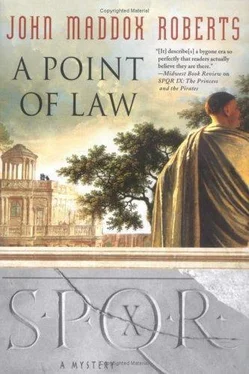John Roberts - A Point of Law
Здесь есть возможность читать онлайн «John Roberts - A Point of Law» весь текст электронной книги совершенно бесплатно (целиком полную версию без сокращений). В некоторых случаях можно слушать аудио, скачать через торрент в формате fb2 и присутствует краткое содержание. Год выпуска: 0101, ISBN: 0101, Издательство: St. Martin, Жанр: Исторический детектив, на английском языке. Описание произведения, (предисловие) а так же отзывы посетителей доступны на портале библиотеки ЛибКат.
- Название:A Point of Law
- Автор:
- Издательство:St. Martin
- Жанр:
- Год:0101
- ISBN:9780312337254
- Рейтинг книги:5 / 5. Голосов: 1
-
Избранное:Добавить в избранное
- Отзывы:
-
Ваша оценка:
- 100
- 1
- 2
- 3
- 4
- 5
A Point of Law: краткое содержание, описание и аннотация
Предлагаем к чтению аннотацию, описание, краткое содержание или предисловие (зависит от того, что написал сам автор книги «A Point of Law»). Если вы не нашли необходимую информацию о книге — напишите в комментариях, мы постараемся отыскать её.
A Point of Law — читать онлайн бесплатно полную книгу (весь текст) целиком
Ниже представлен текст книги, разбитый по страницам. Система сохранения места последней прочитанной страницы, позволяет с удобством читать онлайн бесплатно книгу «A Point of Law», без необходимости каждый раз заново искать на чём Вы остановились. Поставьте закладку, и сможете в любой момент перейти на страницу, на которой закончили чтение.
Интервал:
Закладка:
“You should listen to her,” Sallustius said. “She’s a Caesar.”
“So she may be descended from a goddess, but she isn’t one herself, anymore than her Uncle Caius Julius is a-Did you say you’ve been everyplace these months I’ve been away?”
“I was wondering how long it would take to work its way into your brain. I was going to let you have one more good rant before repeating it. I knew you would take more satisfaction in working it out for yourself.”
“And did your researches among Rome’s political plotters take you to the house of Marcus Fulvius?”
“Oh, yes. And it was a very inspiring setting for mapping out the glorious future of Rome, with its patriotic wall decorations and, well, you’ve been there I understand.”
“I have. Were you invited or did you just barge in after your inimitable fashion?”
“I was invited to dinner, along with several other senators and equites prominent in the assemblies. Curio was there, by the way. He was still with the optimates at the time, but was perceived to be wavering.”
“I take it that this assemblage was not random.”
“By no means. I noted at once that all the guests formed, you might say, a community of predicament.”
I mulled over what I knew of Marcus Fulvius and Curio so unalike in most ways. “Would indebtedness be the common denominator?”
“Very good! Yes, our host was most commiserative. He lamented that this was how a few wealthy men and bankers had gained such undue influence in Roman political life. Office is so ruinously expensive these days, and the only way a man of modest means can hope to be of service to the Senate and People is to go into debt.”
“Might I hazard the speculation that he had an answer to this vexing problem?”
“But of course. And there was none of that Catilinarian foolishness; no suggestion that you should go out and murder your father or set fire to the Circus. Marcus Fulvius and his patrons had a simple and somewhat drastic solution: cancellation of debts.”
“Stop.” I put out a hand. “Just hold it there for a moment. We have been talking thus far about reactionary aristocrats. A blanket cancellation of debt is radical beyond the most outrageous of radical policies. Even the Gracchi couldn’t manage it when they were trying to save the ruined farmers. Lucullus signed his own political death warrant when he tried to alleviate the tax-debt burden of the Asian cities. How did this nobody from Baiae propose to do what nobody has yet managed?”
“Oh, there would have to be proscriptions, of course. Unlike Sulla’s, though, these would fall most heavily upon the equites , particularly the bankers. The Senate and the bulk of the commons would hardly suffer at all. It’s not as far-fetched as it sounds and not all that repugnant. After all, do you know anybody who really likes bankers?”
“Only a dictator can proscribe.” I was beyond astonishment.
“Proscription is nowhere in the Constitution, although it happens when a tyrant seizes power. So there is nothing that says it is a power reserved solely for a dictator. A really powerful cabal could carry it off.”
“Sallustius, surely you could not have believed that this-”
“Did I say I believed him?” He looked truly insulted. “Give me credit for some political good sense. I know a crackpot when I see one. When I hear one, at any rate.”
“And yet he had backing.”
“Certainly.”
“I know already that the house he lived in belonged to Caius Claudius Marcellus.”
“Really? I did not know that, although it’s not much of a surprise. I would have thought one of the other Claudii though. Caius is not the most ardent of them. His brother and cousin are far more forceful.”
“They’re also the most dismal of conservatives. Where did all this radical claptrap come from?”
“A good question. I pondered it at great length, as it occured.” He leaned back in his chair, and I prepared myself to sit through a lecture. Sallustius would have to show off his political acumen. I would just have to let him. His knowledge of Roman political life, both high and low, was comprehensive. And he was no fool.
“First of all, any who took this scheme seriously had to suffer from a political blindness exceeding even that of your family. They think they are still fighting the social struggles of two hundred years ago, patrician against plebeian, nobiles against peasants. Back then the equites formed a tiny class of prosperous farmers who could afford to show up at the yearly muster with a horse.
“But the equites have been quietly growing in wealth and power, and now they are, in fact, the real power brokers of the Republic. If you want to stand for high office, they are the people who can lend you the money to do it. Once you are in office, it is understood that you are in a position to do them favors. Who, for instance, will be collecting the revenues for all those new provinces Caesar has been adding to our Empire?”
“ Publicani , of course. The tax farmers.”
“Exactly the people Lucullus alienated to his own political hurt. Caesar will not make that mistake. He knows where the power lies in Rome. He secured his own position through the assemblies not the Senate. The optimates think of themselves as Rome’s rightfully privileged class. They see ranged against them the populares , whom they perceive as a penniless rabble led by demagogues like Clodius and Caesar. They forget that the populares also include most of Rome’s millionaires. Their well-bred contempt for mere money precludes their giving this bloc serious consideration.”
I thought this over. “So Pompey and his supporters are out. Pompey is far from politically astute, but he understands the power of the equites . He rose from that class himself.”
“Oh, Pompey would never touch anything as foolish as this. And Caesar is not only friendly toward them, he is extraordinarily reluctant to see citizens executed. He’ll kill barbarians in droves, but he is reluctant to see even his mortal enemies killed.”
“So who?”
“Aren’t you interested in knowing what subject was not discussed?” asked Sallustius.
My patience was thinning fast, but he had a point. I was being slow that day. “All right. Did he discuss an attack on the Metelli?”
“Didn’t breathe a word of it. In fact, he hinted heavily that your family would be one of the many great ones who would be solidly behind him. After all, what he proposed was a return of the ever-popular Golden age, when Rome was ruled by the best men, when proper aristocrats drew their modest wealth from the good soil of Italy, when commoners knew their place, and base tradesmen did not flout their ill-grubbed money before their betters.”
“Does anyone really believe there was ever such a time?” I asked. “Well, I suppose Cato does. You don’t suppose-No, even Cato isn’t that loony, and he all but slapped Fulvius in the face when the man confronted me. So what brought about this change?”
“I am guessing that Fulvius changed patrons,” Sallustius said. “None of that crowd who have been howling for your blood were present when I visited his house. They seem to be mostly old Clodians, not at all the sort who would want a restoration of the old aristocracy, much as they might despise bankers and moneylenders.”
“All right,” I said, throwing up my hands. “What are you telling me? I am thoroughly confused, and my time is running short. I go on trial tomorrow, and I would really like to be able to demonstrate that I am not guilty of murder.”
“It’s the boy, Decius.”
“That child is all of twelve years old! Just being able to deliver a competent eulogy doesn’t qualify him for high-stakes political intrigue!”
Читать дальшеИнтервал:
Закладка:
Похожие книги на «A Point of Law»
Представляем Вашему вниманию похожие книги на «A Point of Law» списком для выбора. Мы отобрали схожую по названию и смыслу литературу в надежде предоставить читателям больше вариантов отыскать новые, интересные, ещё непрочитанные произведения.
Обсуждение, отзывы о книге «A Point of Law» и просто собственные мнения читателей. Оставьте ваши комментарии, напишите, что Вы думаете о произведении, его смысле или главных героях. Укажите что конкретно понравилось, а что нет, и почему Вы так считаете.









